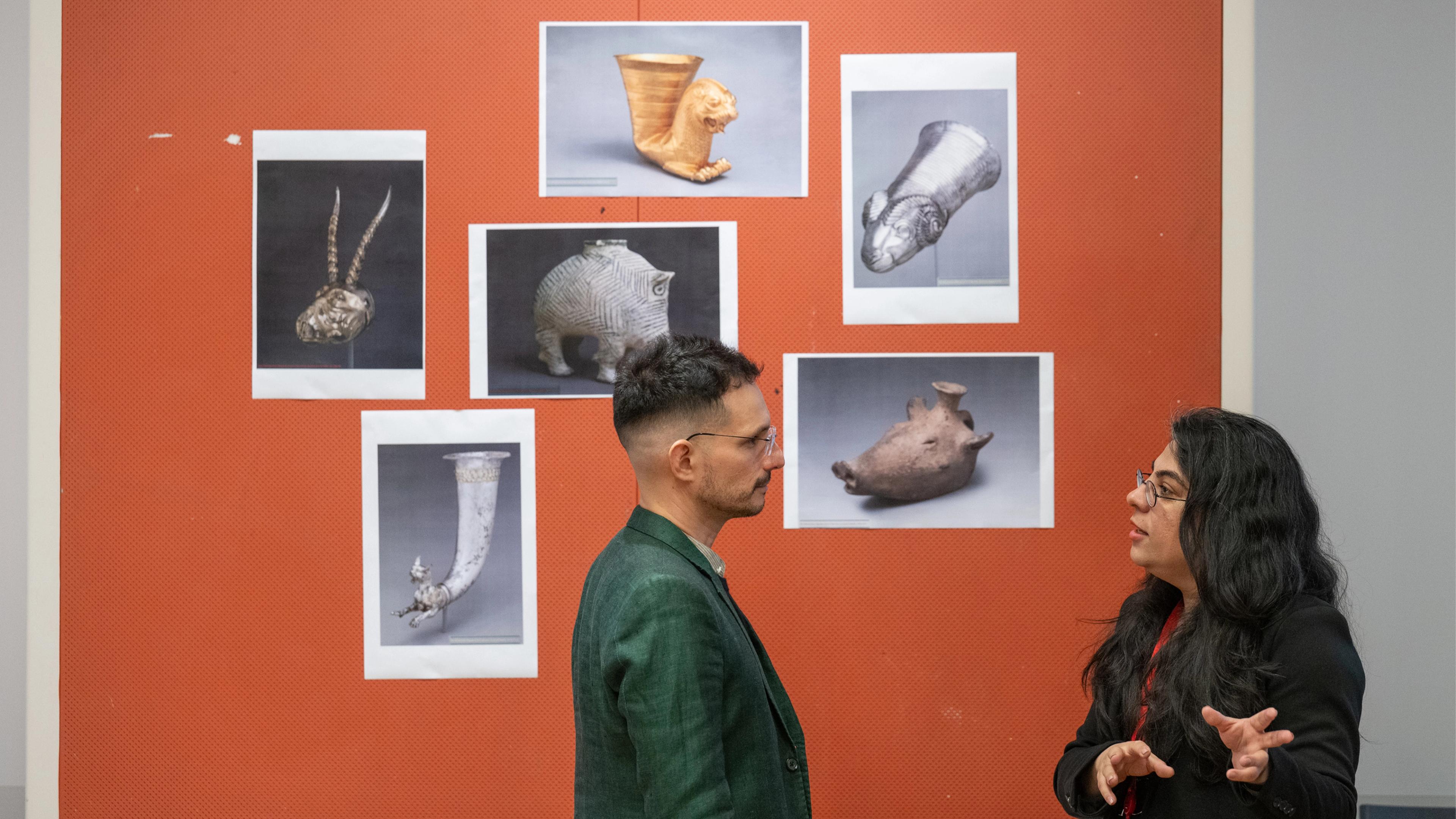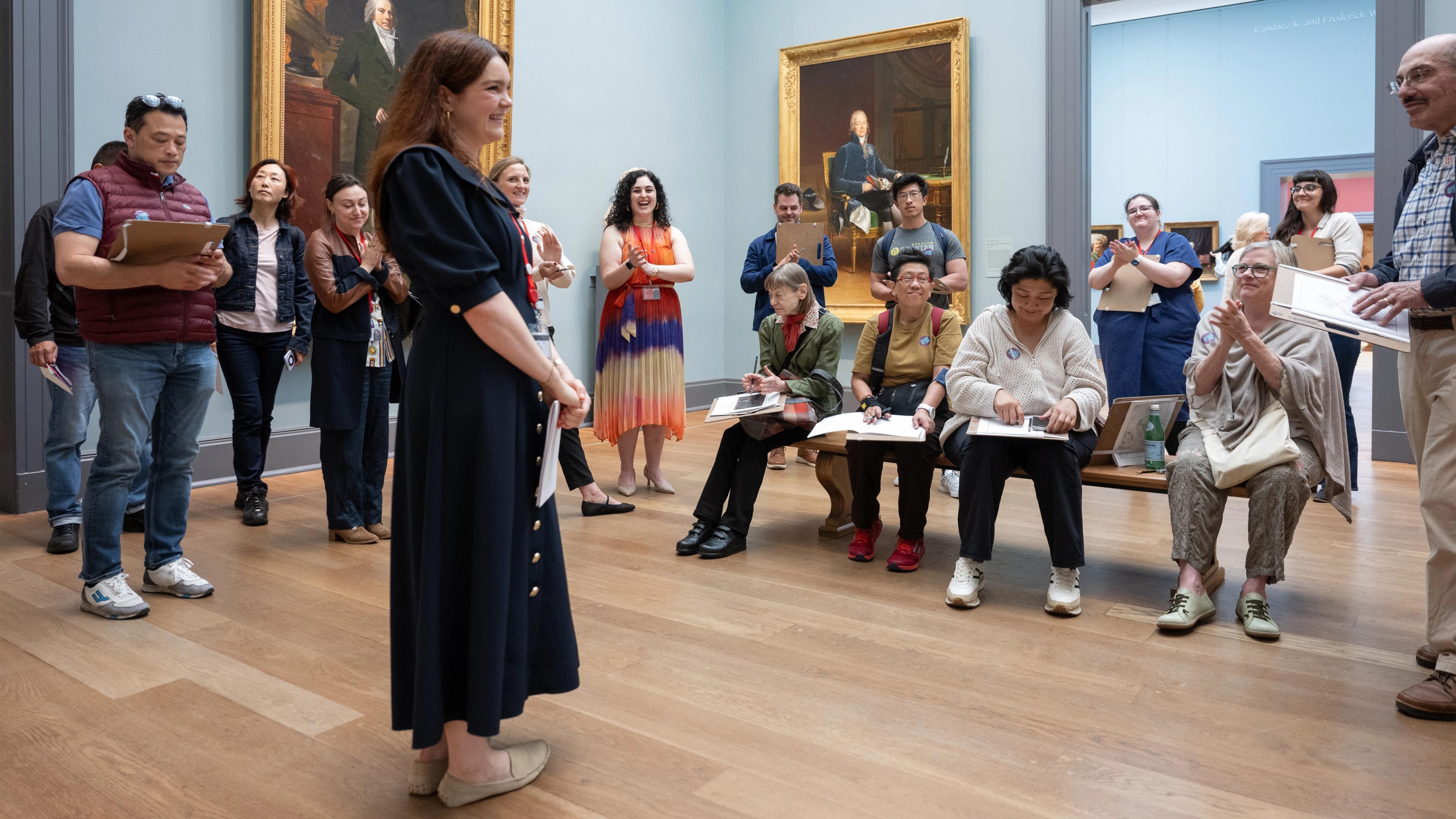Fall and Spring Semester Internships for Undergraduate and Graduate Students
About the Internship
This 10-week, part-time internship offers current students and recent graduates the opportunity to learn about museum practice and gain professional skills in a variety of fields through internships at The Met Fifth Avenue and The Met Cloisters during the academic year.
In addition to developing their skills through projects in various departments, our interns join a community of fellow interns and staff during their time at The Met. All interns participate in a weekly program introducing them to projects, activities, and staff across the Museum. This might include talks in the galleries, presentations by staff, lunches with individual staff members, or behind-the-scenes tours of Museum departments.
Open to:
- Undergraduate and graduate students currently enrolled in a degree-granting program in their second year of studies. First-year students in an undergraduate degree-granting program (BA or AA) are NOT eligible to apply. (Example: a first-year student currently in their spring/second semester may apply to intern during the fall of their second/sophomore year.)
- Recent graduates of an undergraduate or graduate program who have graduated no more than 12-months before the application deadline
- PhD students within the first two years of their program, provided that they have not yet achieved candidacy. PhD candidates are not eligible for internships. If you are unsure about your PhD student eligibility, contact us at collegeprograms@metmuseum.org.
Current and former Met interns:
- If you have been an undergraduate or graduate intern at The Met, you are eligible to reapply, provided you have not already completed 12 months or two or more semesters as an intern. Former interns who have completed a one-semester internship are still eligible to apply for The Met's long-term internships for recent graduates.
- Supervisors may apply to the Education Department to renew the internship of a current intern for the same project or department. Current interns who wish to be considered for an internship in another department must reapply.
International Applicants:
- Undergraduate and graduate internships at the Museum are open to international applicants. Interns are responsible for ensuring that they have valid legal status under applicable US visa regulations while participating in the Museum's paid internship program. All interns must have valid US work authorization. The Museum does not sponsor visas for interns. If you require a visa, you may be eligible to participate in the Exchange Visitor Program (J-1 visa program) by going through an outside agency that has been authorized by the State Department to sponsor a J-1 trainee visa. These sponsors are responsible for supporting and monitoring foreign nationals during their exchange programs in the United States. Note: The J-1 visa program currently requires that interns work 32 hours per week; for this reason, individuals requiring a J-1 visa should only apply to the full-time MuSe Internship Program, not the part-time internship.
- We recommend that you consult with the US embassy in your home country to determine which visa will allow you to participate in this internship. Please be aware that obtaining a visa is usually a lengthy process and can cost upwards of US$1,500; it must be completed well in advance of the internship start date. If you are offered an internship but do not have work authorization before the start date of the program, your internship will be canceled.
Preprogram conservation internships: If you are no longer a student or recent graduate and are looking for a preprogram internship in a conservation department in order to apply to a graduate conservation program, contact us at collegeprograms@metmuseum.org to inquire about your eligibility.
Please see the Application Evaluation Rubric for a detailed description of how your application will be evaluated, as well as an explanation of the selection criteria below.
- $24 per hour (less applicable taxes and deductions)
- 14 hours per week maximum
Fall application deadline: Wednesday, May 13, 2026, 5 pm (ET)
Fall application notification: Second week of August
Fall Internship Program dates: Third week of September through the first week of December (with one week off during the week of Thanksgiving)
Spring application deadline: Wednesday, September 16, 2026, 5 pm (ET)
Spring application notification: Second week of December
Spring Internship Program dates: Second week of February through the third week of April
Please apply using the online application linked below. You will need to upload an unofficial transcript and a résumé describing your past experiences. Students applying for an internship in the Design Department will be asked to upload a portfolio.
We recommend that you review your application carefully before submitting, and perhaps ask one of your instructors or professors to look over your essay and/or résumé as well. If you are unsure about how to write a résumé, we suggest you contact the career services center at your college or university for guidance.
What to Expect After Applying
First, we gather substantial educational projects from supervisors across many Museum departments. We categorize the projects based on their learning outcomes, goals, and department areas. We read the applications and match applicants with projects in their areas of interest. If there is no project available in the department or area you select on your application, we consider your application for all related projects. We select students who above all are enthusiastic and eager to learn. We look for students who demonstrate passion for and commitment to their interests and goals and for whom an internship will be an impactful learning experience.
Once the application deadline passes, the first round of review begins. An Internship Review Committee comprised of staff from across the Museum will consider your application for the two Museum areas you’ve selected. Reviewers evaluate applications using the rubric discussed below and recommend the strongest applicants proceed to a second round of review by the internship supervisors. During this round of review, supervisors evaluate applications using the same rubric, and then select at least four applicants as finalists. These applicants will move to the interview stage. Supervisors will conduct virtual interviews and then recommend one candidate for the internship. Final candidates are sent to the Director’s Office for approval.
Selection Criteria
Please see the Application Evaluation Rubric (PDF) for a detailed description of how your application will be evaluated, as well as an explanation of the selection criteria below.
It’s important to explain what you want to learn from an internship at The Met in your essays. Researching the variety of jobs available in an art museum—and the skills needed to do those jobs—will help you shape and articulate your goals. Once reviewers understand what you’d like to get out of the internship, they can evaluate whether The Met’s program and internship projects can help you meet your goals for learning.
Reviewers look at your past jobs, internships, volunteer work, academic courses, and your personal journeys and consider how this internship could help you grow and/or constitute a turning point in your studies or career. Your application will be stronger if you’re able to demonstrate how the internship could have a strong impact on your growth in one or more areas. This potential impact could be evident in your essays and supported by the experiences on your résumé. For summer applicants, this potential can also be supported by your letters of recommendation about your potential for personal, academic, and professional growth.
Reviewers evaluate the level of personal and academic responsibility your application demonstrates. We’re not only considering your grades, but also whether you’ve been consistent and followed through with your commitments to your chosen activities, jobs, or volunteer work. Reviewers want interns who will show up for themselves and their peers and are ready to learn and take advantage of everything this internship experience can offer. We’re looking across all your materials to find a picture of how ready you are to learn and commit to this internship; a few low grades will not knock you out of consideration. For summer applicants, letters of recommendation are also helpful.
Reviewers look at your past exposure to the arts and art museums, and whether you’ve had any experiences like our internship program. If you’ve already had several museum internships, especially at large museums like The Met, reviewers want to know how The Met’s program can offer something new, and how you’d continue to grow from this experience. Students who have had very little or no prior experiences in the arts due to systemic barriers or unequal access to art and culture will be rated higher in this area.
Life as a Met Intern

Seminar Series
Weekly seminars give interns an understanding of the wide range of work that occurs at The Met, and how Museum professionals collaborate to plan and support the daily operations of one of the world's largest museums.

Public Engagement
Full-time interns complete a two-week MuSe training on museum teaching and public speaking, then design tours or programs that reflect their interests—offering visitors relevant, engaging, and accessible insights into art and The Met from an insider's perspective.
Helpful Links for Internship Applicants
Undergraduate and Graduate Internships are made possible by Adrienne Arsht.
Additional support is provided by Jack and Susan Rudin, gifts in honor of Emily K. Rafferty, The Tiffany & Co. Foundation, Judith Lee Stronach and Raymond Lifchez, Marilyn M. Simpson Charitable Trust, Ittleson Foundation, The Thorne Foundation, Mary Jaharis, Nellie and Robert Gipson, The Billy Rose Foundation, Winston Foundation, and Stefan Soloviev.